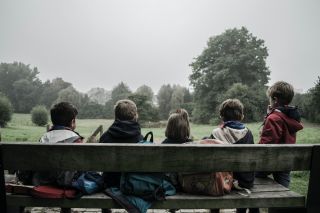Parenting
Five Ways to Help Children Cope in a Violent World
3. Help others in your community.
Posted October 27, 2023 Reviewed by Ray Parker
Key points
- Talking to children about war and violence is one way to help them understand and cope with these issues.
- Both adults and children need to do fun activities together, as it helps build resilience.
- Teach children to think flexibly because all-or-nothing thinking leads to negative emotions and hopelessness.

The world can be a scary place for all of us, but especially children. With the war in Israel, the ongoing war in Ukraine, and an uprise in violence in the United States, including mass shootings, the news is filled with sadness and loss daily.
More people are feeling discouraged than ever, it seems. Even the most positive people can have trouble coping with everything around us. As adults, we can choose to avoid or limit our social media and news coverage.
We can find ways to distract ourselves. But children often get exposed to violence, or news of violence, without warning. They may hear of something terrible that happened, like a school shooting, even though their parents protect them from this type of news at home.
Or they may fall victim to a bomb threat or some other incident at school. Even when they are not directly affected by violence, learning about it can be traumatizing. The innocence of childhood can be quickly shattered if they overhear a news story or they have a friend or classmate who becomes victimized.
With stories of war and violence in the headlines every day, adults feel much more on edge and unsafe. Children can also pick up on this, and no one is immune from the impact that violence has on a person's emotional well-being. I have heard parents say that they want to shelter their children from both hearing about violence and potentially being a victim. This is understandable, but removing yourself and your child from society is not the answer.
It is possible to protect your children to some extent while also equipping them with the tools to help them if they are exposed to information that increases their fear and anxiety. Additionally, there are ways to comfort our children, even when we are stressed about world and national events.
1. Talk to your children about war and violence.
Protecting children from every headline and tragedy is impossible. Even though it's appropriate to limit their access to news and social media during times like these, the odds of them never hearing about any tragedy are not in your favor. So it can be helpful to speak to them about the state of the world in ways they can understand.
Proactively, you can talk to them before they hear about war or death tolls. You can tell them very generally that there are places in the world where war is happening and that, unfortunately, we do live in a world where individuals and groups sometimes resort to violence. You can let them know that they may hear about terrible things in the news from their friends or at school and that you want them to come and talk to you about what they learn.
This will encourage them to come to you for information rather than trying to figure it out on their own or find other sources. You don't need to provide them with specific details about school shootings or countries at war, but you can listen to their questions and concerns. You can respond according to their age and ability to understand.
Allowing them to ask questions and process their feelings about what they've heard or experienced is critical because it demonstrates that vulnerability is acceptable and encouraged. It's OK to be upset, frightened, and need support.
2. Identify safe spaces and techniques to help them stay grounded.
Safe spaces refer to places that give them comfort and remind them they are not alone. A safe space could be their bedroom, a quiet corner in the house, or any location that brings them peace or happiness.
Grounding techniques refer to ways that we remind ourselves that we are safe, even when we may feel unsafe. Sometimes, grounding involves focusing on something around us, such as a landscape, photograph, picture, or anything tangible we can see. Another grounding technique involves deep breathing, taking slow, intentional breaths to calm ourselves.
A third technique includes thinking of a positive memory that would make us feel happy or at peace. When we are distraught about what's happening around us, we can often feel unsafe, even if there is nothing in our immediate environment that puts us in danger. Using grounding techniques or going to a safe space when available can return our brain to a sense of normalcy.
3. Help others in your community.
After a tragedy, whether it's local, national, or international, we often feel helpless. It's hard to wrap our heads around so many bad things happening. Children experience this also, and it can be helpful to teach them that there are things we can do. We can't solve the world's problems, but we can help others in need.
If you pray, you and your child can pray for peace and an end to war. Or you can reach out to your community to volunteer. Sometimes, there are tangible ways we can help the victims or their families. Helping others brings a sense of purpose and value to us that reminds us that, even though /there will always be problems in the world, we can make a difference.
4. Make time for fun and leisure.
In our busy lives and the busy lives of today's children, planning fun activities that do not involve school, extracurricular sports, or other obligations can seem difficult. But you and your children must take breaks from reality and spend time together. It can be something as simple as walking, playing outside, or doing something creative together, such as art or music.
Staying resilient becomes difficult if you are always thinking about serious things. Planning simple but fun activities together teaches them they can find something anywhere or anytime to temporarily distract their mind from the world's woes and enjoy life.
5. Teach them to think flexibly about the state of the world.
Adults have an important role in shaping children's thoughts and behaviors. If children constantly hear us saying that the world is terrible or hopeless, they will quickly adopt those views. If you believe those things, perhaps it's time to think more flexibly.
There will always be violence around us, and there will always be tragedy. Most humans experience a significant loss at some point during their lives. Although devastating wars and mass shootings can feel overwhelming, and it can be hard to keep a positive perspective, we need to avoid all-or-nothing thinking.
This is a type of thinking in which people believe that something is either good or bad, and it's dangerous to have this as our default thinking. Expressing gratitude for anything good in our lives, big or small, can decrease negative thinking. But we also have to be intentional about catching ourselves.
For example, noticing when we make a statement that implies there is no hope, things will never change, we are doomed, etc. It may be helpful to write down some negative, all-or-nothing thoughts that you or your child have, then reflect on how you could modify those thoughts to leave room for hope or a positive outcome.
We can't control what happens in the world around us, but we can have some control over how we respond to it. As parents, we take control in teaching our children how to respond to the world. And these strategies can help you, too, even if you don't have children.




